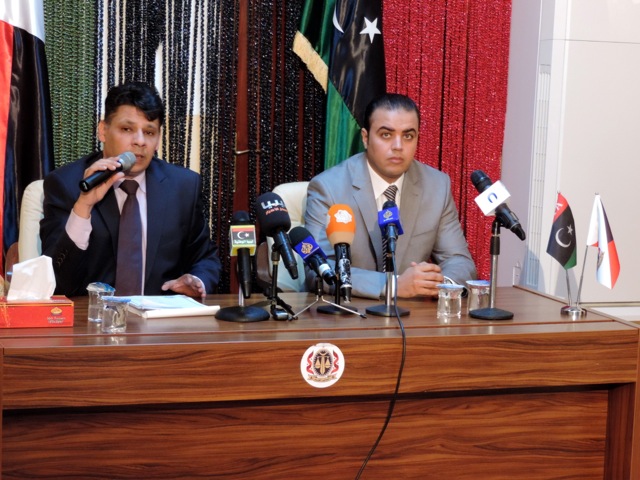By Jamal Adel and Aimen Eljali.

Tripoli, 11 December 2013:
Defending itself against accusation that it was doing little to crack down on . . .[restrict]crime, the Ministry of Justice said today that it is working properly but the police and army were not executing the law.
At a press conference, Sadik Asour, head of the Attorney-General’s investigation department, stressed that there were many wrong assumptions by the media and the public about the work of ministry, but combatting crime required the collaboration of a number of agencies, not just the judiciary.
There was a great deal of crime in the wake of the revolution, Asour noted, but the ministry was doing its best to tackle it.
He claimed that his office had worked on a number of cases and investigations such as the seizure of LD 53-million worth of cash in Sirte, the kidnapping of the Prime Minister, the blockade of oil fields and the alleged passing of cheques, and the assassinations of the senior military figures in Benghazi and Derna.
Investigations into some of these cases had been completed and arrest warrants issued but it was up to the executive authorities to execute them. These were either too weak or not functioning, he said. As a result criminals were still free.
The public prosecutor Anees Abu Saif said they had completed the investigation into the Sirte bank robbery and arrest warrants had been issued.
Warrants too had been issued in relation to the Gharghour massacre event after investigations were completed.
Regarding the allegations by the UN envoy in Libya, Tarek Mitri, of prisoners being tortured, Alsour said an investigation had been launched by the Attorney-General’s office with the aim of enforcing legal standards on all prisons. Plans were in hand too to ensure all detainees were transferred to the legitimate authorities in the country. Those who refused to do so would be charged with kidnapping and illegal detentions of prisoners, he said.
Asour also said that the new transitional justice law would contribute positively to strengthening the judicial authorities in Libya.
Asked by the Libya Herald why the criminals who were released or escaped from prisons at the beginning of revolution were still free while their files were still available, Asour said there that the former National Transitional Council had issued an amnesty for all prisoners although it did not apply to cases such as murder. All cases had to be assessed individually. However, again it was up to the authorities to re-arrest individuals. [/restrict]








